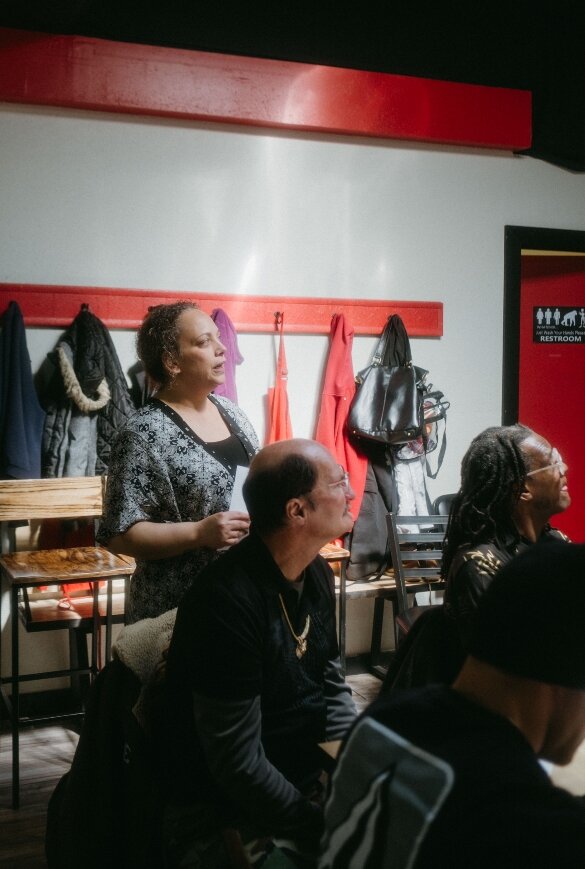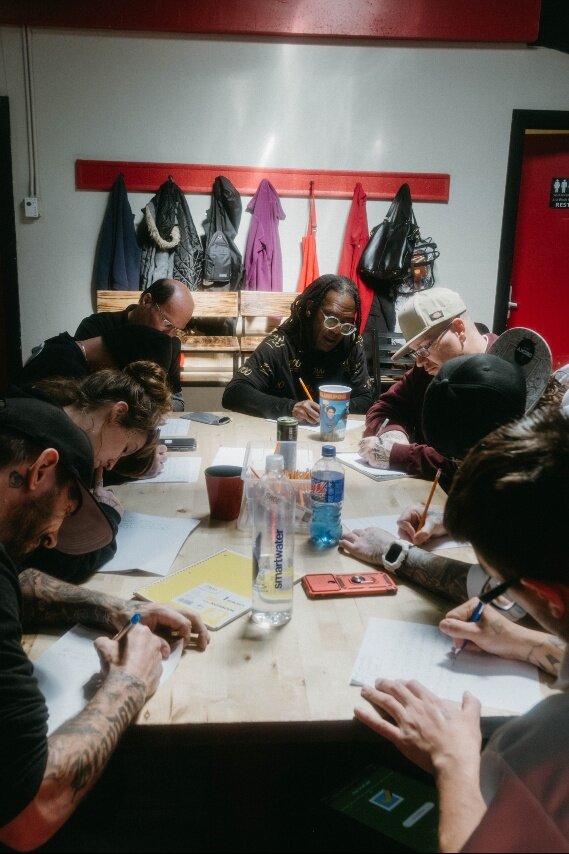After prison, former inmates guide parolees in ‘overwhelming’ transition to life on the outside

DENVER — As Ginger Aber walked through the halls of the halfway house, she greeted everyone by name.
Aber, who was paroled early during the COVID-19 pandemic, works at Tribe Recovery Homes, a sober housing and addiction recovery service that operates in Colorado and Nevada.
“I couldn't ask for a better job, being able to give back to the people who I love, who I have a passion for, and helping them not go through the anxiety of being released from the gates,” Aber said.
One subsect of the organization’s programming, run by Aber, is geared toward supporting people recently released from prison during their re-entry into the community. Newly released parolees are vulnerable to re-offend or relapse into drug use.
The most recent data from the Colorado Department of Corrections, measured in 2020, finds that 28% of parolees will return to prison within three years. Recidivism rates were notably lower than in previous years during the height of COVID.
Helping the formerly incarcerated return to society is one way to reduce those figures, according to the U.S. Department of Justice.
Three years ago, Aber found herself facing the same overwhelming transition as the mentees in the recovery home when she walked out of La Vista Correctional Facility after serving 19 months of an eight-year drug felony sentence.
Aber was one of thousands of incarcerated individuals across the country released early during the COVID-19 pandemic.
Aber said her release was completely unexpected. She had entered a rehab program in prison but left on parole before she could finish it.
She set her parole address as her brother’s house, returning to her old stomping grounds where Aber said, “I’d gotten in trouble.”
“I made a different decision to go to a program to help me do something different with my life,” she said.
After spending about a month with her family, Aber decided to go to a rehabilitation center and then spent a year and a half in therapy. Shortly after graduating from rehab, she started working at Tribe Recovery Homes as a peer navigator helping participants through their own recovery.
Soon, she transitioned into her current role working specifically with formerly incarcerated individuals.
“I want to help my people,” Aber said of the parolees.
“That's my passion and my purpose. Going back into the prisons and being able to bring hope to those who are incarcerated, saying, ‘Hey, if I can do this, you can do this.’ And being able to give them a path to come out to.”
After leaving prison, Aber said having the support of her family made all the difference in her transition back to society. Behind bars, she said all her decisions were made for her: when she could go somewhere, when she could do something, when she could eat and when she could sleep.
When her brother first asked her what she wanted to eat, she said it felt surreal and anxiety-inducing. That was after less than two years of incarceration.
“[Prison] had become my way of life, my everyday norm,” Aber said. “When you leave and there's no routine and there's nothing there, it becomes pretty overwhelming.”
The program Aber runs offers support through the first year after someone’s release, starting from day one. Aber said she picks participants up from the gates of the facility, takes them to get set up at the parole office and helps them get situated in their new housing.
The program also provides them with food boxes, clothing and gift cards.
“I don't think [people] understand the realness of what it's like to not have somebody there,” Aber said. “If somebody doesn't have that, it seems like they don't have anything.”
As Aber prepared for her own release, her case manager told her about the outcomes of five women she had released that month: two relapsed and overdosed within two days, two re-offended and were back in prison within two weeks and one was successful.
As Aber sees it, the opposite of addiction is connection. Without a support system, it’s difficult for people to successfully adjust to life outside of prison.
“When they have no connection coming out, they go back to what they know instantly,” Aber said. “It’s not an if, it’s a when.”
When people “go back to what they know,” as Aber put it, they’re likely to return to the behavior and situations that led to their initial incarceration.
Darnell Reed had been in and out of the Colorado prison system for about 30 years on drug-related charges. He joined the Tribe recovery program in June 2022 and graduated a year later.
After the program, Reed found himself in a relatively stable place with an apartment and a job. However, Reed said he lost touch with the program and the people in it, and he relapsed later that year. He attributed his relapse to losing that connection. Reed rejoined the program in January and is working on his recovery again.
Reed said that working with Aber has shifted his perspective on his situation. He said she taught him to look beyond his anger at the system and see the way his behavior affects his family and himself.
“I’m learning to change my thinking and change my attitude and change my behavior because I don’t want to go back,” Reed said. “I’m changing today because I got four kids. I’m a grandfather. I’m a great-grandfather.”

Aber works with formerly incarcerated individuals, like Darnell Reed (right), as they transition back into their community after prison.
Photo: Peter Vo, Rocky Mountain PBS.
In addition to family support and therapy, another factor that helps keep people from returning to prison is employment skills. During her time in prison, Aber participated in an eight-month entrepreneurship and education program run by Breakthrough.
“It’s that specific program that changed my life while I was in there,” Aber said. “It gave me purpose. It gave me direction. It showed me that people really cared about me and wanted me to succeed.”
Stephen Dailey participated in the Breakthrough program during his time at Colorado State Penitentiary. He said when he was incarcerated at 21 years old, he didn’t have a lot of life experience or understanding of how the professional world worked. He worried about what his job prospects would be after he was released.
“Breakthrough gave me the biggest boost of confidence that I had in my entire 13 years of D.O.C. [Department of Corrections],” Dailey said. “They empower you to not just think for yourself, but to act for yourself, and to not regret what you think or what you do.”
On the day he was released, Dailey said he didn’t stop smiling from the time he took his release photo to the moment he arrived at the halfway house.
He has two jobs now, one working in purchasing and sales at a fastener warehouse and the other part-time at GameStop.
Upon his release, Dailey felt motivated and empowered to reintegrate his community. He said he noticed not all the men he lived with felt that same level of control over their situation.
“I saw a lot of guys just deflect responsibility,” Dailey said. “I saw a lot of guys just not care. That's their prerogative and that's fine. But that wasn't mine. I knew what was ahead of me and that's what I wanted to go to.”
Aber stressed the importance of having relationships to lean on after being released from prison. Dailey said the prison environment can make it difficult to make or maintain those relationships — or even remember what that connection feels like at all.
“It's almost like you're cut off, maybe even numb in certain times. You can't feel compassion, sincerity or love,” Dailey said. “Some guys don't even get visits, so their relationships are from a payphone, and it's so hard to have that connection with people.”
To have that connection severed... it's almost something that you have to physically experience to actually understand that level of loss,” he said.
The Breakthrough program invites volunteers to visit participants during classes and program events so they can foster new, meaningful connections.
Breakthrough graduates like Aber and Dailey have access to the program’s reentry support after their release. One of the first calls Aber said she made after she got out was to the program’s co-founder, who showed up at her brother’s house a few days later with a laptop, a phone and a backpack with supplies, including masks and hand sanitizer.
Three years later, Aber said she still gets messages from the program staff asking her if she needs any support.

As part of Tribe Recovery Homes’ reentry program, Aber teaches employment skills and strategies. She teaches what she learned as a participant in an entrepreneurial program in prison.
Photo: Peter Vo, Rocky Mountain PBS
The Breakthrough program taught Aber how to build a resume, how to network and how to dress and prepare for a job interview.
Now, Aber teaches those skills to participants at Tribe Recovery Houses as part of the WAGEES program designed for people recently released from prison. (WAGEES stands for Work and Gain Education & Employment Skills.)
Aber hosts regular classes at the program’s halfway house focusing on these employment skills. Attending the sessions is a requirement for program participants.
During class, Aber also focuses on building confidence and community between the participants. Before she dismisses the class, she asks everyone there to compliment the person sitting next to them.
By passing along the knowledge she learned in Breakthrough — a program she credits with saving her life — Aber is working to break the cycle of recidivism by creating a new cycle of solidarity and support among formerly incarcerated individuals.
“I may not have been on the yard you’ve been on, and you may not have been on the yard I’ve been on, but we’ve all been on a yard,” Aber said to the class after a lesson on how to craft an elevator pitch.
“I’m going to give you some tools to help you, but I’m not going to be the person to save your life,” she said. “These people sitting at this table, the people you live with, those are the people who are going to save your life.”
Carly Rose is a multimedia journalist at Rocky Mountain PBS. Carlyrose@rmpbs.org.
Peter Vo is a multimedia journalist at Rocky Mountain PBS. Petervo@rmpbs.org.
